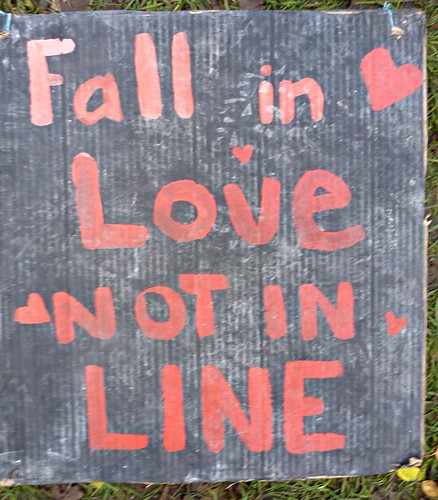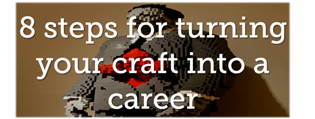“By the time you are ready to explore the world of love, you are filled with so much rubbish about love that there is not much hope for you to be able to find the authentic and discard the false.” ~Osho
Relationships are hard. Yes, I know that’s not exactly a groundbreaking statement. But it’s a fact. A fact that I’ve been pondering a lot lately as I witness the many stages of relationships being experienced by close friends and acquaintances.
There are those friends who are engaged or newly married, others who are separated or newly divorced, friends who are experiencing the highs and lows of dating, friends who are content playing the field, friends who are happy being alone. There’s even my own relationship, which many – especially those who know me as a hot-headed, commitment phobic, and often contrary woman – are quietly amazed has lasted as long as it has.
Though my associates and I are all experiencing different stages of relationship, we all share a common trait. None of us have a clue what we’re doing. We’re all just guessing. Rolling a dice and hoping that we don’t lose too much in the process, or crap out completely.

Truth is, most people tend to follow a pretty familiar script when it comes to relationships. Our expectations of gender roles, relationship timelines, and the ways love should be shown have been stamped onto our psyches over years of conditioning from families, movies, romance novels, r&b love songs. Most of us will never question established ideas of love and romance. Even when something deep inside of us starts to suspect that we aren’t 100% comfortable with those age-old ideas. So without any clear alternatives and with few successful real-life examples to follow, we go on trying to fit ourselves and our significant other into relationship models and behaviors that are considered normal and acceptable. On the rare occasion when one does question and decides to diverge from the “normal” path, one finds that there are no road signs, no footprints to follow, just a wide open wilderness that requires the fearless instincts of a trailblazer to navigate.
Thankfully, even trailblazers have certain tools to help them find their way.
I recently came across a book entitled “Being in Love: How to Love with Awareness and Relate Without Fear” written by Osho. Since being introduced to Osho’s writings a few years ago, he’s quickly become one of my favorite philosopher-teachers, and this book is testament as to why.
I’ll be frank. You may not agree with everything in this book. Some of it may even upset you. But I guarantee you will find some common-sense wisdom and thoughtful insights that will challenge you to think differently about how you love yourself and others and may even cause a complete paradigm shift for you. Fortunately, Being in Love (and every other Osho book I’ve read) is one of those books that you don’t have to read from beginning to end to get the benefit of it; you can just pick up and start reading from anywhere.
Here are just a few snippets from Osho’s Being in Love:
What is Love
“It is almost like somebody asking, “What is food?” Would you not be surprised if somebody came and asked you that question? Only if somebody has been starved from the very beginning and has never tasted food would the question be relevant. It is the same with the question “What is love?”
Love is the food of the soul, but you have been starved. Your soul has not received love at all, so you don’t know the taste. So the question is relevant, but it is unfortunate. The body has received food so the body continues; but the soul has not received food so the soul is dead, or is not born yet, or is always on its deathbed.”
Parental Love
“Just think of your own parents…. They are victims just as you are victims; their own parents were the same. And so on…you can go back to Adam and Eve and God the father! It seems that even God the father was not very respectful to Adam and Eve… he started commanding them, “Do this” and “Don’t do that.” He started doing the same rubbish that all parents do… each parent threatens to expel the child, to throw him out. “If you don’t listen, if you don’t behave, you will be thrown out.” Deep down the child starts hating the parents because he is not respected; deep down he starts feeling frustrated because he is not loved as he is. He is expected to do certain things, and only then will he be loved.
And children learn the ways of their parents—their nagging, their conflict. Just go on watching yourself. If you are a woman, watch—you may be repeating, almost identically, the ways your mother used to behave…. If you are a man, watch: What are you doing? Are you not behaving just like your father? Watch and see when your mother is there, functioning through you—stop that, move away from it. Do something absolutely new that your mother could not even have imagined.”
The Perfect Man or Woman
“That idea too has been put into your mind—that unless you find a perfect man or a perfect woman you will not be happy…. A loving person simply loves, just as an alive person breathes and drinks and eats and sleeps…. You don’t say, “Unless there is perfect air, unpolluted, I am not going to breathe.” You go on breathing even in Los Angeles; you go on breathing in Mumbai. You go on breathing everywhere, even when the air is polluted, poisoned…. People who demand perfection are very unloving people, neurotic. Even if they can find a lover they demand perfection, and the love is destroyed because of that demand.”
“Love ordinary people. Nothing is wrong with ordinary people. Ordinary people are extraordinary! Each human being is so unique; have respect for that uniqueness.”
Gender Roles in Relationships
“Watch people, see how they take each other for granted. If your wife prepares food for you, you never thank her. I’m not saying that you have to verbalize your thanks, but it should be in your eyes. But you… take it for granted—that is her work. Who told you that? If your husband goes and earns money, you never thank him. You don’t feel any gratitude. “That’s what a man should do.” That’s your mind. How can love grow?”
“At home, the woman is a wife and the man is a husband. Now when these two persons meet there are really four persons: the husband and wife, who are not real persons but just personas, masks, false patterns, expected behavior, duties, and all that, and the real persons hiding behind the masks.
Those real persons feel bored.”
Give and Take in Relationships
“People are more interested in how to grab and get. Everybody is interested in getting and nobody seems to enjoy giving. People give very reluctantly… they always go on watching to make sure they get more than they give—then it is a good bargain, good business. And the other is doing the same.
Give, and don’t wait to see how much you can grab…. In the beginning it will be hard, because your whole life you have been trained not to give but to get. In the beginning you will have to fight with your own armor…. In the beginning it will be difficult, but each step will lead to a further step, and by and by the river starts flowing.”
Being Alone versus Being Lonely
“There are two types of love. One is the love that happens when you are feeling lonely: as a need, you go to the other. The other love arises when you are not feeling lonely, but alone. In the first case you go to get something; in the second case you go to give something. A giver is an emperor.”
Sex
“Most people’s sexual life is nothing but a kind of relief. Yes, for a moment you feel relieved of a burden, just like a good sneeze. How good it feels afterwards! But for how long? How long can you feel good after a sneeze? How many seconds, how many minutes can you brag that “I had such a sneeze, it was great.” As the sneeze is gone, with it goes all the joy, too. It was simply something bothering you. You are finished with that botheration, now there is a little relaxation. That’s the sexual life of most of the people in the world.
For afterplay to happen it needs a romantic mind, a poetic mind, a mind that knows how to be thankful, how to be grateful. The person, the woman or the man who has brought you to such a climax, needs some gratitude: afterplay is your gratitude. And unless there is afterplay it simply means your sex is incomplete; and incomplete sex is the cause of all the troubles that a human being goes through.”
No matter what stage of relationship you’re in – whether you’re starting one, or ending one, or you happen to be alone – Being in Love will give you fresh perspective on what it means to make the most out of every relationship and blaze your own trail to true love.
cheers,
k
photo “Fall in Love … not in line” by Martinho, on Flickr










You highlight a key to finding and maintaining a true love – learn and understand more about love.
Many of us have learnt incorrect things about love.
People like Osho have tried to open our eyes – there is so much known about love that when you read, hear and understand it love becomes much easier.
We found it helped us find our true love – even wrote a free e-book about it – wwww.findtruelovebook.com. Every little bit of knowledge helps us grow.
Glorious points here Esra. Our outer world is truly a reoicetlfn of our inner world. Love is really the root of where this all begins. Thanks for the reminder to operate from love by loving myself first.